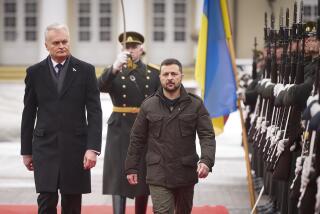Lithuania Bends, Urges Parliament to Delay Secession : The Baltics: The action would make possible independence talks with Moscow. The Cabinet insists the move is only a ‘temporary moratorium.’
- Share via
MOSCOW — The Lithuanian government, retreating from its three-month-old declaration of independence, recommended on Saturday that the Baltic republic’s Parliament suspend the declaration in order to begin negotiations with the central government on Lithuania’s secession from the Soviet Union.
The Lithuanian Cabinet proposed that the Supreme Council, the republic’s Parliament, declare a “temporary moratorium” on the independence act to meet Soviet President Mikhail S. Gorbachev’s demand that the unilateral Lithuanian declaration be suspended before negotiations begin.
“The government suggests to the Supreme Council of the Republic of Lithuania that it debate the possibility of declaring a temporary moratorium on the (independence) act for the period of negotiations with the Soviet Union,” a government statement issued in Vilnius said.
The declaration of independence, adopted March 11, would remain valid, government officials said, but its implementation would be suspended while negotiations were under way. Lithuania remains determined to become independent, they said, but wants to negotiate its future relationship with Moscow.
The proposal must be approved by the Lithuanian Parliament, many of whose members are outspoken advocates of immediate and full independence for their nation, and then accepted by the central government.
But the shift was significant enough for the official Soviet news agency Tass to say on Saturday that it “could mark the beginning of the solution of all the ‘Lithuanian problem.’ ”
Until now, Lithuania said it would freeze only the implementation of the hundred-plus laws and resolutions adopted after the independence declaration, but it refused to suspend or rescind the declaration itself, as Moscow has demanded as a condition for negotiations.
Such action, Lithuanian leaders argued, would amount to accepting voluntarily Lithuania’s status as a constituent republic of the Soviet Union. The small nation, which was independent for 18 years between World War I and World War II, was forcibly incorporated into the Soviet Union in 1940 in a pact made by the Kremlin with Nazi Germany.
Gorbachev has said that Lithuania does have the moral right of self-determination and a constitutional right to secede from the Soviet Union, but he has insisted that the terms for its withdrawal must be negotiated within the framework of the Soviet constitution and legislation.
In talks last week with the presidents of the three Baltic republics, including Lithuania’s Vytautas Landsbergis, the Soviet leader significantly relaxed those conditions, clearing the way for a compromise.
“If Lithuania will suspend the implementation of this act of independence, we may start to talk,” Gorbachev said on Tuesday. “That means suspending its implementation at least for the duration of the talks.”
That was the intent of the Lithuanian Cabinet, which met in Vilnius under Premier Kazimiera Prunskiene, who has led the search for a compromise. “Our act of independence would remain valid,” Gentaras Jatkonis, a government spokesman said, “but we are postponing the realization of it.”
The Lithuanian Cabinet was at pains nonetheless to portray the proposed suspension as no retreat from the principles contained in the declaration.
“A moratorium does not mean that the act is abolished,” the government statement said. “A moratorium only means that for the duration of the negotiations the use of the rights stemming from the independence act is postponed, and the status of Lithuania as an independent state does not change. Breaking off the negotiations automatically brings an end to the moratorium.”
Under the Cabinet’s proposal, Lithuania would suspend the declaration immediately, but it would implement the decision and begin the talks, which have been sought by both sides, only when Moscow has fully lifted its economic blockade.
The proposal, despite these precautions, could encounter strong opposition on Tuesday in the Lithuanian Parliament, which is dominated by members of Sajudis, the pro-independence movement led by Landsbergis. The Cabinet, a coalition led by the highly respected Prunskiene that includes Communists as well as Sajudis members, is regarded as more moderate and less confrontational than the Parliament.
The proposal was supported by the Lithuanian Communist Party, which broke with Moscow on the issue of Lithuanian independence and remains a political force in the republic.
While declaring the independence declaration to be “irreversible,” the party said that there is a need for a transition period to consolidate real statehood for Lithuania, and it urged the republic’s leadership to do its “utmost” to start negotiations with the Soviet Union.
Gorbachev’s offer of compromise, including a new and looser status for the Baltic republics within the Soviet Union, was welcomed on Saturday as “quite a positive move” and “very serious” by Dainis Ivans, chairman of the Latvian Popular Front, which seeks independence for Latvia.
“This proposal of the president expands the vistas for political movement and produces various possibilities in solving our problem,” Ivans said in a television interview broadcast on the Soviet nightly news program Vremya. “This is a move forward, and it cannot remain unanswered.”
The Baltic Assembly, which groups the popular fronts of Estonia, Latvia and Lithuania, met on Saturday at Jurmala, a Latvian beachfront resort, to coordinate strategies in their campaigns to reestablish the independence of their nations.
In a message to the parliaments of the three republics, the assembly warned that “nobody has a right to demand either the abrogation or halting the acts on independence. A retreat will harm the democratic movement,” it said.
Landsbergis, addressing the meeting, called for a united approach to Moscow. “We should tightly clasp hands so that the hold should not be broken and that the Baltic link remains intact,” he said.
The Baltic Council, which is made up of top government officials from the three republics, is expected to meet later this week to discuss Gorbachev’s proposals following debates in each of the parliaments.
Going well beyond an offer to negotiate terms for their secession, Gorbachev outlined to the Baltic leaders his vision of a commonwealth of sovereign states bound together by varying political, economic, cultural and social ties, and he urged the Baltic nations to participate in the talks in which this new union is forged and to consider joining it.
As Soviet Premier Nikolai I. Ryzhkov promised Prunskiene last week, the central government’s punishing economic blockade of Lithuania is being eased. The flow of natural gas to Lithuania was increased sufficiently on Saturday to permit the reopening of a key fertilizer plant this week, officials in Vilnius said.
The plant is expected to get 3.5 million cubic meters of gas daily, allowing it to return to operation by the end of the week.
More to Read
Sign up for Essential California
The most important California stories and recommendations in your inbox every morning.
You may occasionally receive promotional content from the Los Angeles Times.













